Editor's note: Blackouts have become synonymous with Nigeria’s power sector and many rural poor are suffocating under the yoke of poverty aided by darkness.
Inefficient transmission and distribution network has been a major concern and the little power on the grid is often rationed and distributed to favour rich neighbourhoods who are more disposed to pay. This is in spite of the provisions in the law for power consumption subsidization for the rural poor.
Olajide Adelana reports on how the recent blackout experienced in Mokwa, Niger state is a proof that the power sector privatization has brought little or no respite to the rural poor in Nigeria.
Rocks and dirt clods clanged against cars and trailers as they drove past the town. It had just rained and huffs of water soon took over the main road; the only tarred road that cuts through the town linking the southwestern part of the country to the north.
A woman in her mid-thirties struggle to save her wares from the ensuing flood that followed. She hurriedly beckoned at passersby to help her.
These days, rainfall has been a frequent occurrence in Mokwa but something else has assumed a more permanent residence –the darkness that envelopes the town at night.
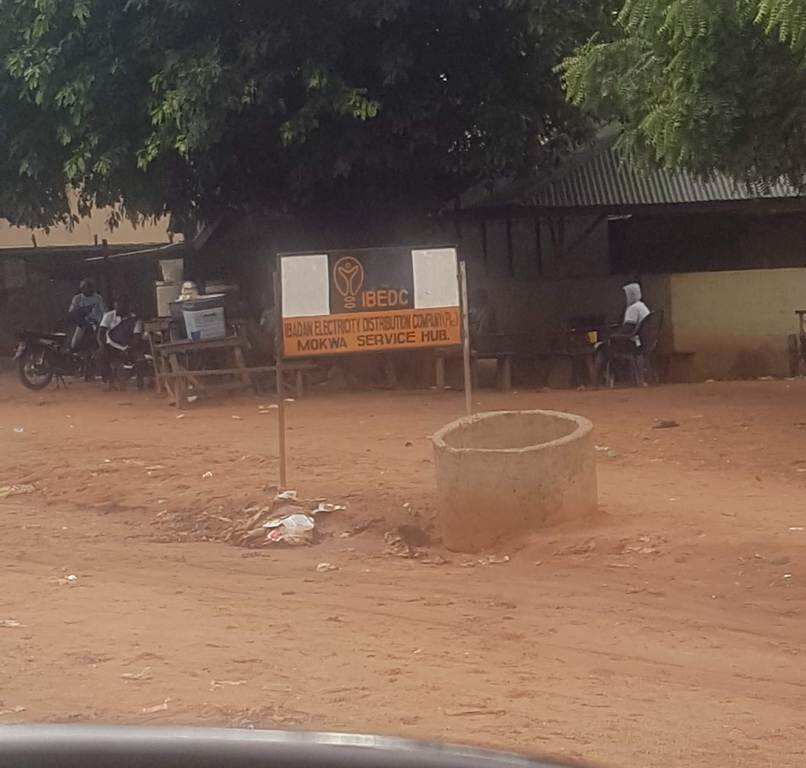
Ibadan Electricity Distribution Company, Mokwa station (IBEDC). Photo credit: Olajide Adelana
PAY ATTENTION: NAIJ.com upgrades to Legit.ng: a letter from our Editor-in-Chief Bayo Olupohunda
Mokwa, a town in Niger state, arguably the most important route for heavy trucks, trailers and travelers connecting the north from the southwest has been in darkness for over 7 months and nothing seems to be changing.
This has negatively impacted on residents and traders with major businesses relocating to outskirts of the town and neighbouring villages where power supply is somewhat reliable.
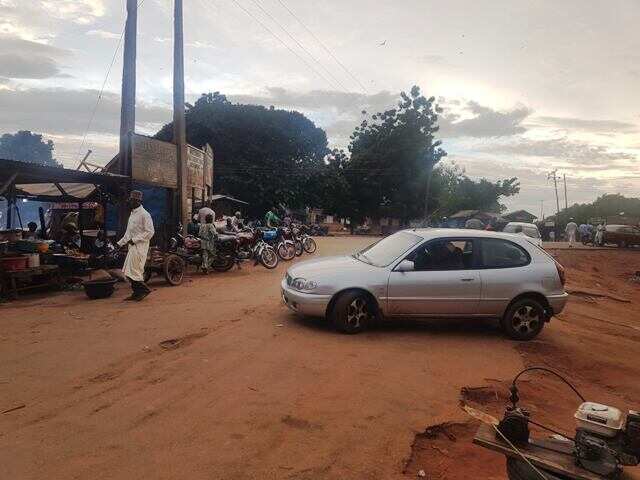
It is close to dawn here, Mokwa ready to become a ghost of itself. Photo credit: Olajide Adelana
For Abdullahi Kabiru nothing is more disheartening than this. Abdullahi who sells iced drinks had to relocate his business to Jebba, a neighbouring town where electricity supply is stable so as to keep up with requests from his customers.
“I have to take my business to another place. All my customers were asking for cold drinks but I couldn’t match up because of the light issue. Since I moved to Jebba, I have experienced more sales and my business is better for it,” says Abdullahi with the help of an interpreter.
Another resident who feels the pain as much as others is Ndako Mohammed. Mohammed retired as director, information services, Mokwa local government area in 2012 and receives a paltry N13,000 monthly pension.
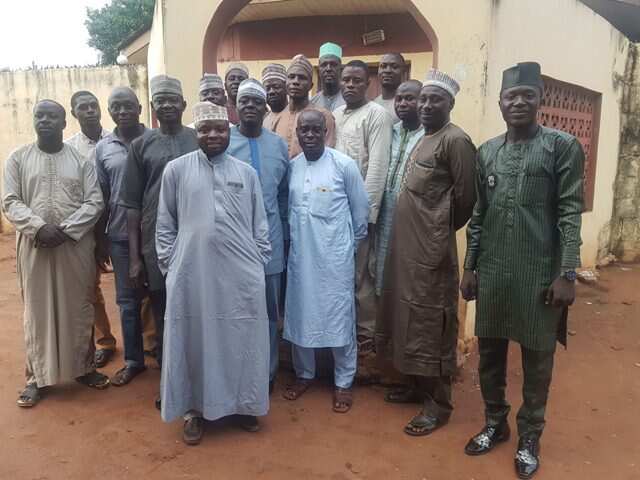
Members of Mokwa progressive forum after a meeting to find solution to the power problem in the community. Photo credit: Olajide Adelana
He lives from hand to mouth and could barely cater for his needs. But the poor power situation has only worsened his condition.
“I am a retiree and I collect N13,000 as pension monthly. This is so unfortunate despite the promises made by our Pension Fund Administrator (PFA) that they will trade with our money and from there pay us well. But it is a sad experience for retirees in Mokwa.
“See me, do I look happy? To make matters worse, we have been in darkness for months now. Apart from the security implications, it is gruesome and impalpable to cope with. The light issue has aggravated my fragile financial status. For example, how do I get water?
“Mokwa is not close to any river and there is no pipe borne water. So we have to rely on borehole to get water and without generator it is very difficult. Besides that, you need to buy fuel for the generator and is it from the N13,000 that I will be buying fuel when I still have my last child in the university?,” he asked.
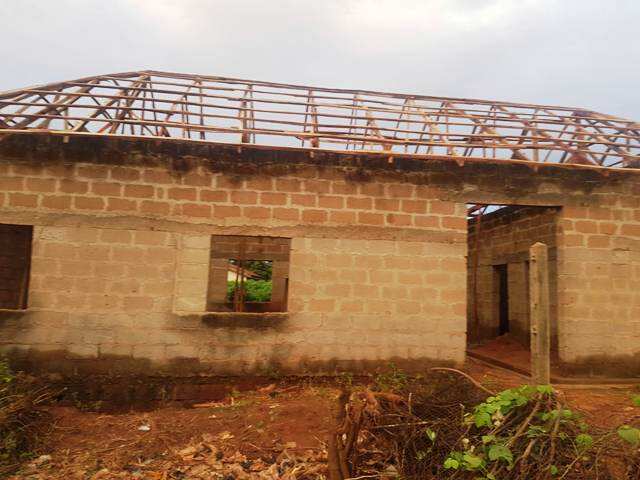
The control station for the new transformers. Photo credit: Olajide Adelana
It was questions as this that members of Mokwa forum, a local association of community stakeholders, gathered to find answers to during the last Sallah celebration when this reporter visited.
The forum has been at the forefront of interfacing with government and Ibadan Electricity Distribution Company (IBEDC), the electricity distribution company in charge of the area. Whilst gathered, the chairman of the association, Mohammad Jubril addressed members on the latest developments in restoring power to the area. Before then, he gave a brief overview of the power situation in the area.
“We have what we call step-down transformers and they are the ones giving us problem. The step down transformers help us to step down the light coming from Jebba for local use. But it is old and has been overloaded due to the population growth.
"The transformer was provided 33 years ago. We have written several letters for this transformer to be changed and felt that privatization would make things easy but this is not so.
“Anytime we go to IBEDC’s office in Ibadan they will refer us to their Ilorin office. Ilorin office will now direct us to Jebba and that is how we have been going back and forth. We have spent a fortune trying to resolve this problem,” he submitted.
Although succor came to the community in May when the Niger State government intervened and awarded a contract of N156 million for the provision of two new step-down transformers and additional 10 new transformers, residents still had to wait for another 2 months before installation accessories were provided. Even then, residents complain about the slow pace of work at the project site.
“We appreciate the government for intervening but we don’t understand why the project is not given prompt attention. As we speak the transformers have not been energised,” said Mohammad Hassan, the president, Federation of Mokwa Youth Association (FOMYA).
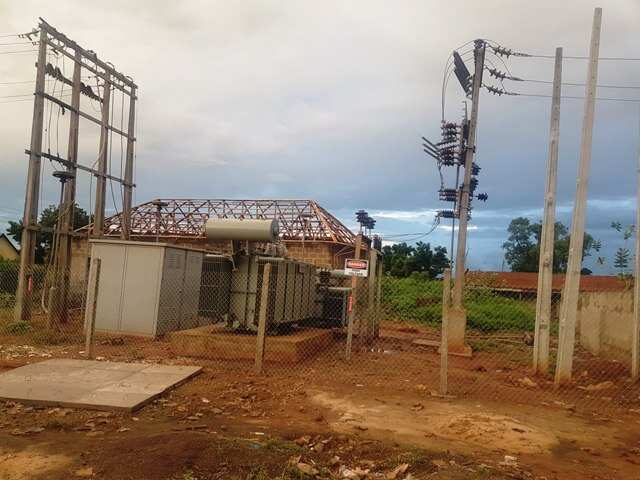
The new step down transformers bought by the Niger state government. Photo credit: Olajide Adelana
But in all of this, community sources say that IBEDC rarely showed concerned.
“After we pleaded to no avail that IBEDC should provide us with a new transformer and restore power. We finally have our own transformer and thanks to the State government. But then when power comes back fully they will come around to start billing us,” Yemisi Adeoyi, a trader in the community said.
Effort to speak with IBEDC zonal office in Jebba proved abortive as the communications manager, Ms. Zainab Galadima declined comments and insisted she would only talk when she has clearance from the head office. She then promised to get back to the reporter but didn’t after several weeks. Subsequent calls made to her phone were not answered.
A staff of IBEDC, who is privy to the Mokwa power crisis, said there has been no prompt response by IBEDC to replace the necessary infrastructure needed to restore power because of the lack of resources to do so. Besides that, the staff added, Mokwa is not commercially viable and it is expected that other communities and areas that are commercially viable would first be given priority.
Power Consumer Assistance Fund (PCAF): The hope for the rural poor that never was
Kunle Kola Olubiyo is the president, Network for Energy Reforms. He believes IBEDC could afford to toy with Mokwa because the area is largely rural and might not be very profitable for the DisCo.
“You know Mokwa is a rural area and the DisCo might not be getting much revenue from there and as such they can afford not to pay much attention to them. However, going by the law they (DisCo) are meant to cater for every infrastructure under their franchise area,” he said.
Perhaps this was what the Electric Power Sector Reform Act (EPSRA) 2005 envisaged by making provision for a Power Consumer Assistance Fund (PCAF) where both government grant and cross subsidy from eligible customers are channeled to support electricity consumption by the poor and average Nigerians who otherwise would have been in darkness if they were to pay prevailing electricity tariff for electricity that is consumed.
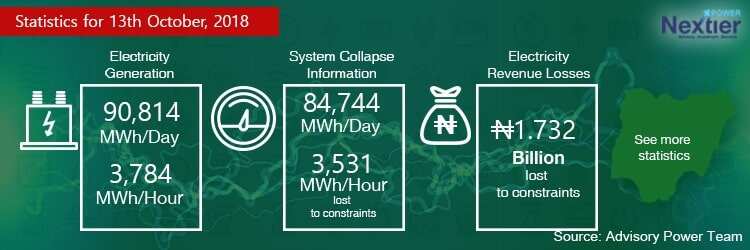
Power sector infographics. Photo credit: Olajide Adelana
But years later, the fund is yet to kick off and this sadly points to bigger problems bedeviling the Nigerian power sector since its privatization in 2005.
Following the unbundling of Power Holding Company of Nigeria (PHCN), its assets and infrastructure were bought over by private investors who had shown capability in playing significant role and investing in the electricity value chain from generation (GenCos), to transmission (TCN) and then distribution (DisCos).
Thereafter 11 DisCos including the IBDEC were incorporated to take charge of different franchise areas also called distribution zones.
This was expected to tremendously improve the power sector but rather it seems to have complicated issues with DisCos claiming that they have never made profit since they took over the assets.
As a way out, experts have advocated for adequate metering arguing that appreciable improvement would only be recorded if more investment is made in tackling revenue losses and energy theft.
The DisCos somewhat concur but think otherwise. Despite continued increase in tariff from an average of N10 per kilo watts per hour in 2007 to N24.20 per kilo watts per hour in 2017, the DisCos would rather favour an upward review of electricity pricing citing the need to have a cost reflective tariff as provided for by Multi-Year Tariff Order (MYTO), a methodology for regulating electricity prices.
But this has only raised more doubts about the commitment of the DisCos with many accusing them of not wanting to do away with estimated billing, a billing system that has seen consumers outrageously billed.
As at August 31, 2018 about four million electricity users of the 7.4 million registered users are still without meters, says Nigerian Electricity Regulatory Commission (NERC). With the exception of Benin and Port Harcourt DisCos, no other DisCos have metered up to 50 per cent of its customers.
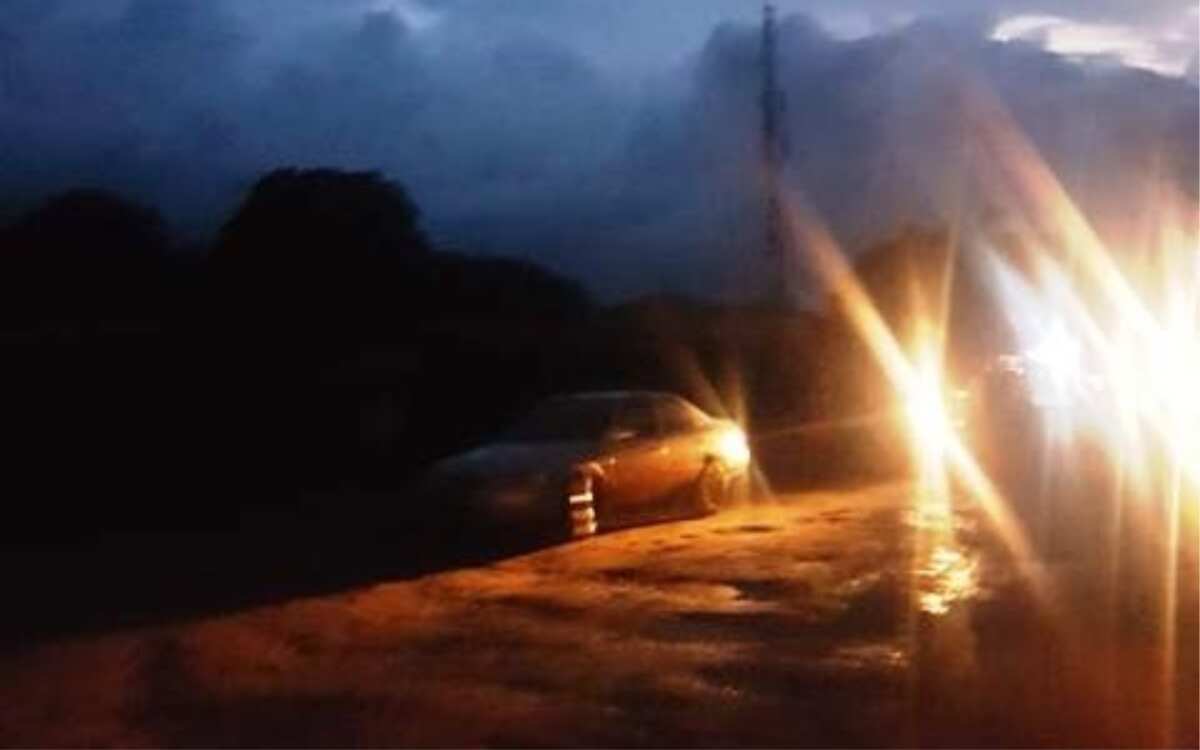
Mokwa at night. Residents ready to stew in darkness. Photo credit: Olajide Adelana
Ibadan DisCo where Mokwa falls under has the largest customer base of 1.474m from which over half -864,760 customers are still paying bills on estimation.
“Overall, three in every five registered electricity consumers in Nigeria are unmetered,” a recent report by NERC says.
PCAF and how the poor was sold a dummy
In all of this, thoughts of how the poor would cope with increase in electricity tariff seem elusive. Yemi Oke is an associate professor of electricity law at the University of Lagos (UNILAG). He says the PCAF ought to have been operational even before discussion about tariff increase was brought to fore.
“If you are to go with the Electric Power Sector Reforms Act (EPSRA), the PCAF ought to have been in place even before we started discussion about increasing electricity tariff. Surprisingly, we have had MYTO reviewed and attention was never diverted to PCAF. Quite frankly, the fund has not been constituted.
"There is no manager, there is no fund to be utilized, and definitely no one is implementing it. In no way has that part of the law been given effect to and everyone is aware including the DisCos and the government,” he said in an interview with this reporter.
Is the government aware and why have they not implemented PCAF?
Moses Arigu is an expert in the electricity, gas and petroleum industries and also the commissioner in charge of Consumer Affairs, NERC. He says there are no modalities for the operationalization of PCAF and this has stalled its implementation by the government.
According to him, there is no structure to identify the poorest of the poor who are the target beneficiaries and government would only kick start the PCAF when all necessary conditions to prevent the fund from being hijacked by the rich and corrupt minded persons are put in place.
“Yes, PCAF is meant for the poor but in the western world one will need to identify the beneficiaries. No one is providing physical cash to the poor but all that is needed is to identify the poor.
"In developed climes they have the structure to really identify those that are truly poor but here we don’t have it. In the past, steps have been taken to address this issue and that is the way to go because if not everybody will claim they are poor.”
Oke, however, shares a different view. He believes the PCAF is not likely to work as presently constituted because the EPSRA of 2005 was not intended to operationalize the power sector.
At best, Oke stressed, the Act was only meant to midwife the privatization process as it didn’t take into consideration the challenges and practicality of a whole lot of its provisions during and post-privatization of the sector.
As it stands, it is safe to say PCAF was a dummy sold to the poor for the purpose of privatization but is there a way out of this dilemma?
Critics say a good place to start from is to admit that not much progress seems to have been achieved since privatization of the power sector. Alex Okoh is the Director-General of the Bureau of Public Enterprises (BPE).
He believes that the power sector privatization has not met its objectives largely because of industry issues such as electricity pricing, efficiency of the DisCos, and infrastructural issues.
But for the Coalition for Affordable and Regular Electricity (CARE), the dismal state of the power sector would continue to linger until the privatization of the power sector is reversed.
In a recent statement, the group posits that many consumers were suffering black out despite the marginal improvement in electricity generation due to dilapidated transmission and distribution facilities.
The group puts the blame squarely on power companies’ lack of capacity to invest and bring about sustainable improvement and stability in the supply and distribution of electricity.
Wumi Iledare however disagrees. Iledera who is a professor of petroleum economic and policy research says a review instead of an outright cancellation of the privatization agreement would be a step in the right direction.
He also called for the review of the Electric Power Sector Reform Act adding that it will help to address structural issues in the sector.
READ ALSO: 2019: INEC raises alarm, says parties nominate underage for presidential election
“I don’t support the cancellation of privatization agreement. But I do not mind a review because we have not seen any tangible benefit of that exercise. Any distribution or generation company that is not performing on the basis of the key performance indicators given should be brought to book,” Iledera says in a chat with a Nigerian newspaper.
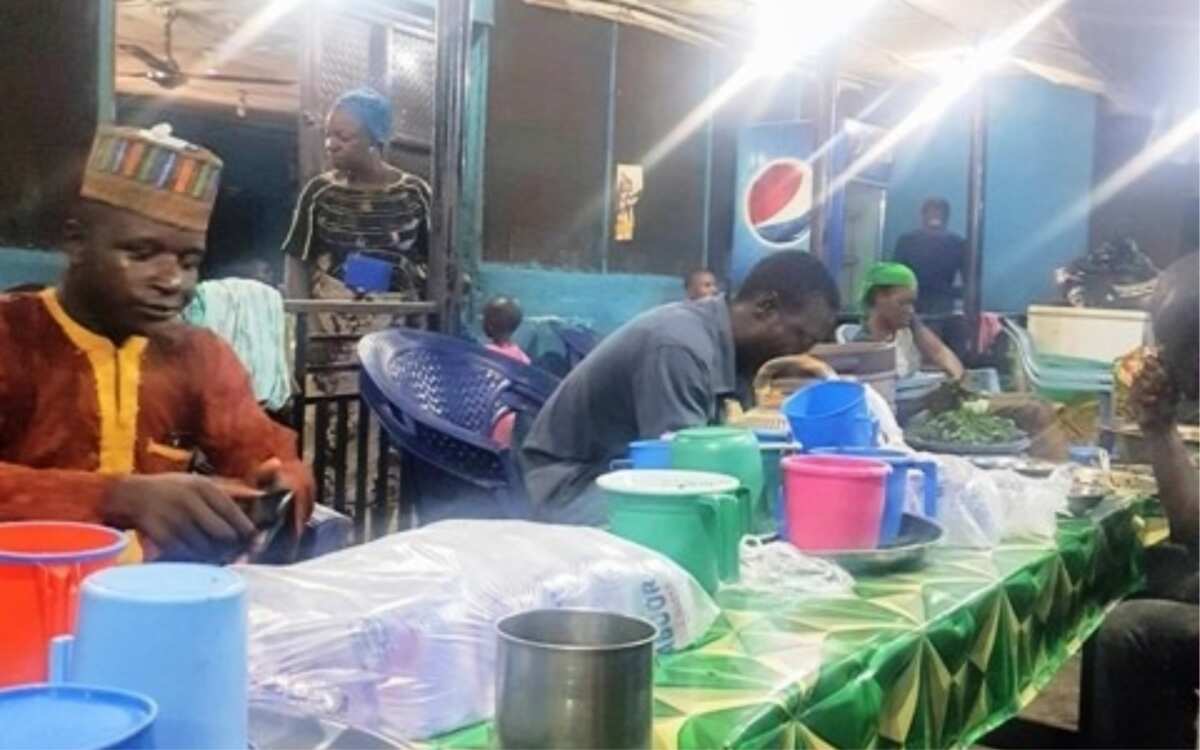
Toughened up by the situation, this local eatery is one of the few still opened for business. Photo credit: Olajide Adelana
Regardless of whatever solution is employed, Mohammed and other residents of Mokwa would care less if it doesn’t stop them from sleeping in darkness while they watch dusk crawl up the sky and across their bedroom windows.
This report was supported by Wole Soyinka Centre for Investigative Journalism (WSCIJ) Regulators Monitoring Programme (REMOP) for the energy sector.
Meanwhile, Legit.ng had previously reported on the with wailing over poor power supply by Nigeria, the federal government is reportedly making plans to supply electricity to a West African nation Burkina Faso.
NAIJ.com (naija.ng) -> Legit.ng We have upgraded to serve you better.
Fashola EXCLUSIVE Interview: How Nigeria Can Have Uninterrupted Power Supply | - on Legit TV
Source: Legit.ng
